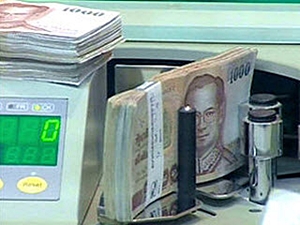BANGKOK, Jan 25 – The Bank of Thailand (BoT), the country’s central bank, cut the policy interest rate Wednesday by 0.25 percentage points from 3.25 per cent to 3.00 per cent per annum, with immediate effect, to help boost the post-flood economy.
The BoT’s Monetary Policy Committee (MPC) today resolved unanimously by a 7-0 decision to cut the repurchase rate as widely anticipated.

“With private sector confidence improving but still fragile, this policy accommodation should help accelerate the return of economic activity to normal levels,” the MPC said in its statement.
The MPC assessed that inflationary pressure remains contained, while headwinds from the global economy continue to pose risks to Thailand’s economic growth, said Paiboon Kittisrikangwan, committee secretary.
The impact of the floods on the Thai economy was greater than previously assessed and the restoration process is likely to be more drawn out.
The MPC projected that manufacturing production would return to normal by the third quarter of this year, supported by government measures, improving confidence, and accommodative monetary conditions.
The positive momentum generated by these factors would help to limit downside risks to growth, especially the drag on exports from a slowdown in global demand.
The MPC assessed that the global economic outlook had weakened further. The euro zone is likely to enter a recession, undermining the authorities’ ability to solve the sovereign debt problem in the region. On the other hand, economic conditions in the US improved, but limited fiscal policy space and continued weakness in the housing market would constrain economic growth in the periods ahead to remain below potential.
Economic growth in Asia moderated slightly, as softer global demand tempered export growth in the region.
Inflationary pressure declined, reflecting a more prolonged recovery in domestic demand and a slowdown in commodities prices in line with weakening global demand.
Nonetheless, the boost to economic activity from reconstruction spending and various government stimulus could exert some upward pressure on inflation going forward.
Meanwhile, Mr Paiboon said the latest economic growth forecast–to be released in the next two weeks–is expected to revise growth domestic product (GDP) in 2012 and 2013 to reflect latest economic data.
He said the GDP projection is likely to be revised downward, thanks to adverse impacts from last year’s floods and the global economy.




